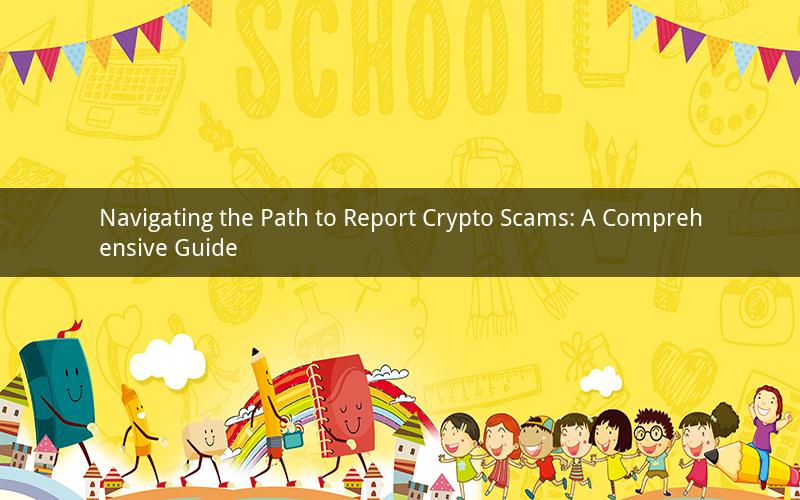
In the rapidly evolving world of cryptocurrencies, scams have become a persistent threat. As more individuals and businesses delve into the crypto space, the need for a reliable and effective way to report crypto scams has become increasingly important. This article aims to provide a comprehensive guide on where to report crypto scams, highlighting the key platforms and steps to take to ensure your report is heard and acted upon.
I. Understanding Crypto Scams
Before delving into the specifics of reporting crypto scams, it's crucial to understand what they are and how they operate. Crypto scams can take various forms, including phishing attacks, Ponzi schemes, and fraudulent Initial Coin Offerings (ICOs). These scams often target unsuspecting individuals looking to invest in cryptocurrencies or use them for transactions.
II. Reporting Crypto Scams: The Key Platforms
1. Local Authorities
In many cases, the first step in reporting a crypto scam is to contact local authorities. This can include police departments, consumer protection agencies, and financial regulatory bodies. By providing detailed information about the scam, you can help authorities investigate and take appropriate action.
2. Cryptocurrency Exchanges
If you've been targeted by a crypto scam on an exchange, it's essential to report it to the platform. Exchanges often have dedicated teams to investigate and address such incidents. Provide all relevant information, including the scammer's account details and any transactions involved.
3. Regulatory Bodies
Several regulatory bodies worldwide focus on cryptocurrencies and related activities. Reporting scams to these organizations can help ensure a coordinated response and potentially lead to legal action against the scammers. Some notable regulatory bodies include:
- United States: Financial Crimes Enforcement Network (FinCEN), Securities and Exchange Commission (SEC)
- Europe: European Union Agency for Cybersecurity (ENISA), European Banking Authority (EBA)
- Asia: Japan Financial Services Agency (JFSA), Hong Kong Monetary Authority (HKMA)
4. Cryptocurrency Community Forums and Social Media
The cryptocurrency community is often vigilant about scams and can be a valuable resource in reporting them. Platforms like Reddit, Twitter, and BitcoinTalk can be used to share information about scams and alert others to potential dangers. Additionally, many exchanges and crypto projects have dedicated forums where you can report scams.
III. Steps to Follow When Reporting Crypto Scams
1. Gather Evidence
To effectively report a crypto scam, it's essential to gather as much evidence as possible. This can include screenshots of the scam, transaction details, and any communication with the scammers. Ensure you keep a record of all interactions to provide a clear picture of the incident.
2. Be Detailed and Accurate
When reporting a crypto scam, provide as much detail as possible. Include the date of the incident, the amount of money involved, and any other relevant information. Be accurate in describing the scam and its impact on you or your business.
3. Follow Up
After reporting a crypto scam, it's essential to follow up with the relevant authorities or platforms. This ensures that your report is being addressed and helps in the investigation process. Keep track of any communications and follow up regularly if necessary.
IV. Frequently Asked Questions (FAQs)
1. Q: What should I do if I've been scammed out of my cryptocurrency?
A: Contact local authorities, the cryptocurrency exchange involved, and relevant regulatory bodies. Gather evidence, be detailed in your report, and follow up regularly.
2. Q: Can I report a crypto scam anonymously?
A: While some platforms may allow anonymous reporting, it's often beneficial to provide your contact information for follow-up purposes. This helps authorities and platforms in investigating and addressing the scam.
3. Q: What happens after I report a crypto scam?
A: Authorities and platforms will review your report, gather more information, and take appropriate action. This may include freezing the scammer's assets, warning the public, or initiating legal proceedings.
4. Q: Can I report a crypto scam if it occurred internationally?
A: Yes, you can report an international crypto scam. Contact the relevant authorities in your country and provide as much information as possible about the scam and its perpetrators.
5. Q: How can I stay safe from crypto scams?
A: Stay informed about the latest scams and warning signs, use secure and reputable exchanges, and never share your private keys or sensitive information with others. Be cautious of unsolicited investment opportunities and always verify the legitimacy of a project or individual before engaging.
In conclusion, reporting crypto scams is crucial in protecting yourself and others from falling victim to these fraudulent activities. By understanding the key platforms and steps to follow, you can ensure that your report is heard and acted upon. Stay vigilant, gather evidence, and work with authorities to combat the ever-growing threat of crypto scams.